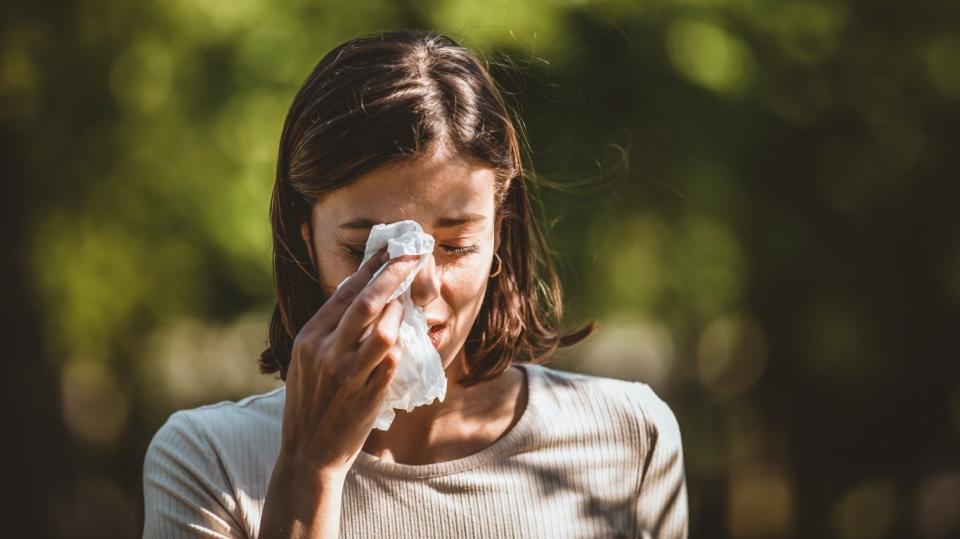Seasonal allergies are getting worse: What to do, how to check pollen counts
If you've sworn your springtime allergies are worse this year — in between sneezes, coughing fits and bouts of rubbing at itchy, watery eyes — chances are you're not wrong.
For the tens of millions of Americans who are plagued by pollen every year, conditions are only getting worse as warmer temperatures exacerbate seasonal allergies, causing plants to blossom earlier and produce pollen longer into the season.
"When we get milder seasons, things start to thaw much quicker. ... Things start blooming earlier and then pollen production starts sooner. We're almost seeing it start weeks ahead of time, so those that suffer from seasonal allergies become symptomatic much earlier than they normally would've," said Dr. Devang Doshi, an allergist at Allergy, Asthma and Pulmonary Center in Royal Oak. "The production of pollen not only starts earlier but continues now for a longer duration of time, so the pollen amounts are higher, and the season lasts longer."
"This has unfortunately been a trend for a few years now, and it looks like it's going to get worse if the temperatures stay milder every winter," he continued.
After a particularly warm winter this year, it's no wonder why this season's allergies have felt notably more intense.

What are seasonal allergies?
When pollen makes contact with your eyes or nose, many people's bodies recognize it to be a foreign invader, like bacteria or a virus, and feel the need to defend the body from it. The defensive chemicals that the body releases are what causes those miserable allergy symptoms.
Spring allergies are most often caused by tree pollen, summer allergies are usually triggered by grasses and allergy symptoms in the fall may be due to wheats, ragweed or mold.
While all environmental allergies cause the same itchy-and-runny eyes, nose and throat symptoms, Doshi says that tree pollen tends to contribute more to seasonal allergies, given that trees' tall height allows gusts of wind to easily sweep the powdery and particulate pollen up and spread it out.
In metro Detroit, common tree types that trigger allergy symptoms are oak, birch, maple, cedar and pine.
More: Reed Ranch in Oscoda County gets new owners after 90 years
What outdoor conditions make allergies worse or better?
Dry, breezy days make allergy conditions worse, as wind gusts aid in spreading more of the tiny pollen granules.
On the other hand, rainy or humid days can alleviate allergies by helping to "wash" tree pollen out of the air, or making the pollen so damp that it can't be transported as easily.
Additionally, pollen counts are usually highest in the mornings, when plants are releasing more of their pollen in time with pollinators' daily activity and before humidity has had a chance to weigh the pollen down.
What's the best way to check pollen counts?
Doshi says that it can be hard to determine an exact pollen count, given that pollen counts are subject to change based on conditions as broad as the weather or as specific as your neighborhood.
"Weather plays a real big part of it ... and then what's happening locally," said Doshi. "If you live in an area where people are mowing lawns regularly, it's going to increase some of the pollen that you're exposed to."
However, you can get a general idea of the pollen count by checking your local weather app or entering your zip code into a pollen count tracker like on The Weather Channel, IQAir or pollen.com.
More: Detroit receives $85M to replace 8,000 lead service lines annually
How to prevent or alleviate allergies
You can prevent allergy symptoms by limiting your exposure to pollen and other environmental allergy triggers, especially when pollen levels are high:
Keep any windows around you, whether it be windows in your home, car or office, shut to block out the pollen.
If you want to go for a walk outdoors, wait until dusk or after a rain shower when pollen levels are low.
If you spend time outside, change your clothes or bathe upon returning inside to remove pollen sticking to your hair, clothes and body.
If you've got outdoor pets, wipe down their coats and paws to keep them from tracking pollen inside your home.
If these preventative measures aren't good enough, you can install electrostatic air intake filters to further keep your indoor environment free of pollen.
In terms of treatment, you can take antihistamines to suppress your body's immune response or other over-the-counter medications to relieve symptoms. If your allergic reactions are severe or making you feel just plain miserable enough, doctors may recommend allergen immunotherapy to increase your tolerance to an allergen.
This article originally appeared on Detroit Free Press: Seasonal allergies are getting worse: What to do

